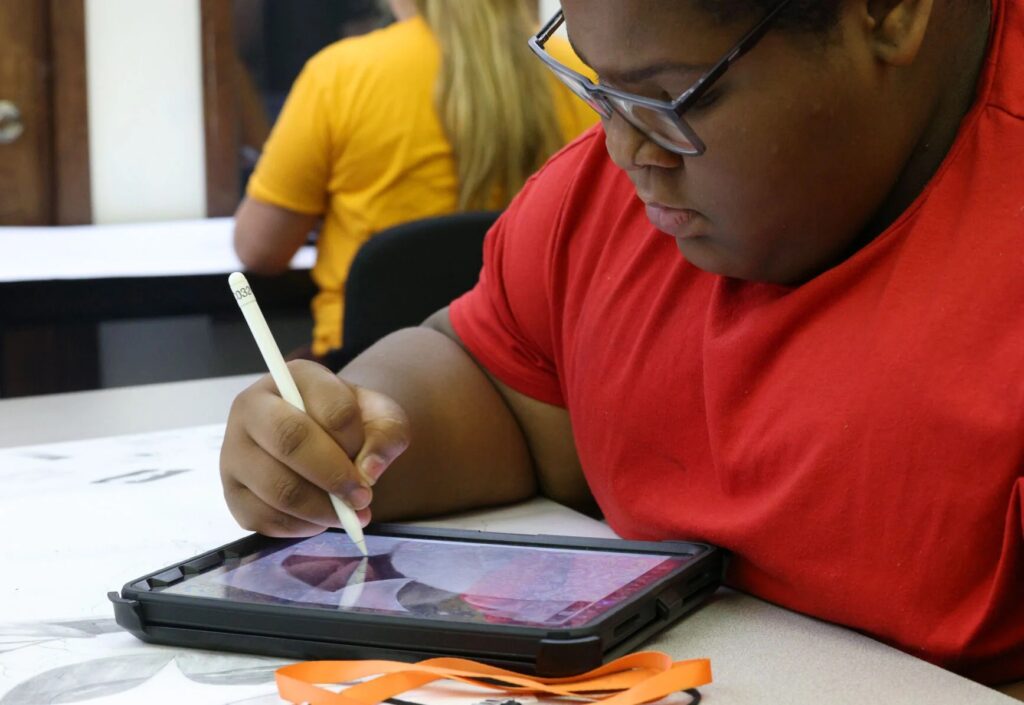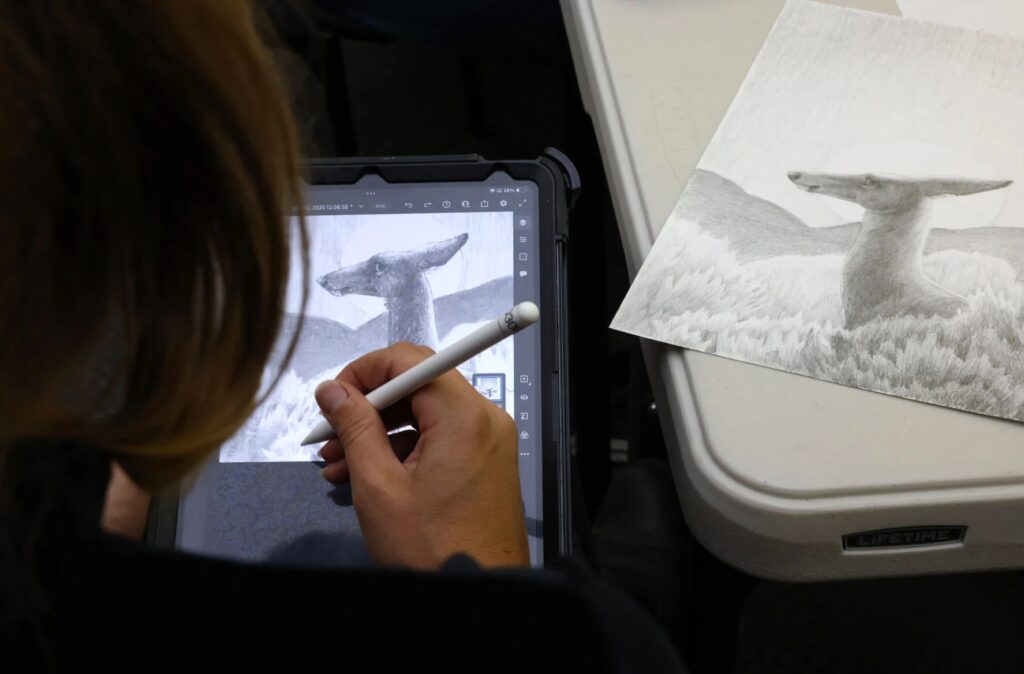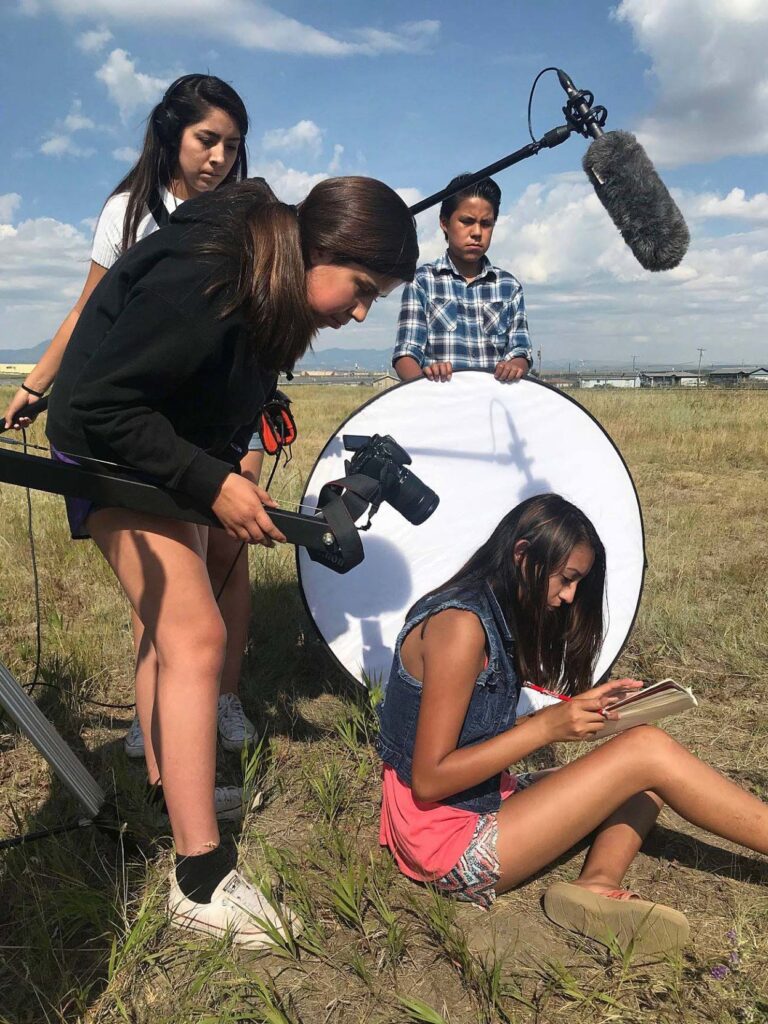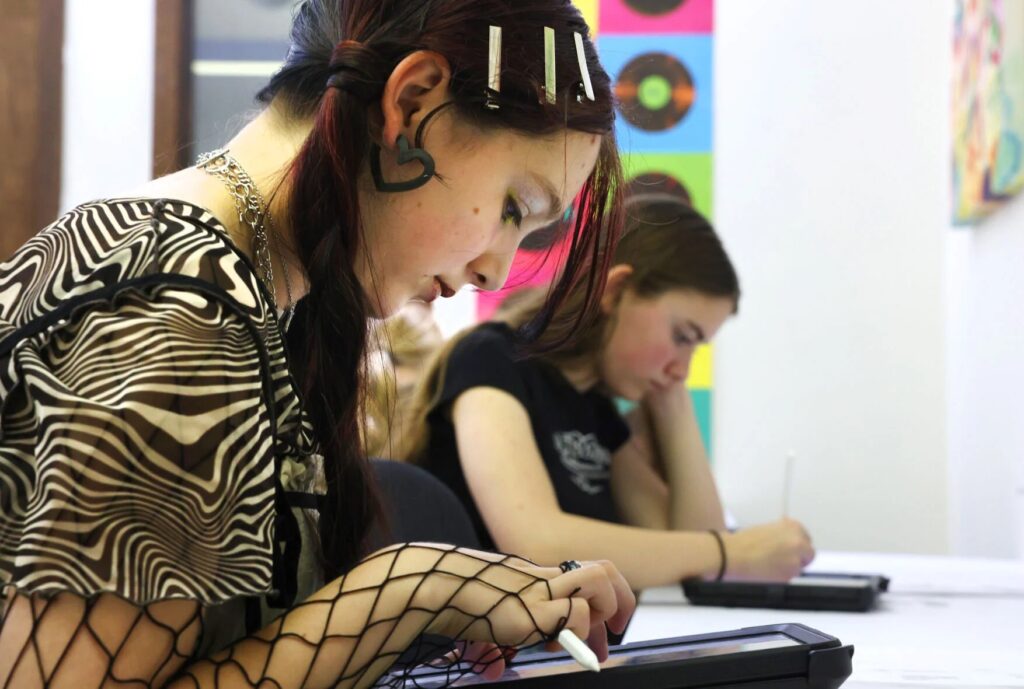Half of MAPS Media Institute’s funding for this upcoming fall’s programming is in limbo after the federal government froze funds allocated for after-school programming across the country.
The program has offices in Hamilton, Helena and Harlem, serving kids on the Fort Belknap Indian Reservation, providing free media arts education to middle and high school kids in subjects like graphic design, music production and documentary filmmaking.
MAPS is one of about 80 organizations in Montana that have received federal funding to provide after-school care and learning programs to kids in Montana. MAPS will likely survive if the funding isn’t released, though at reduced capacity, but administrators worry about smaller programs that may not be as lucky. One state lawmaker said it’s too early to consider whether the state needs to intervene.
In 2023, MAPS won a Governors’ Award from the National Academy of Television Arts and Sciences Northwest for making long-lasting contributions to the arts in the region.
The program has 18 staff members and serves hundreds of students at each of its locations, Executive Director Clare Ann Harff said, often teaching kids who may not fit in on a sports team or with a religious group and would otherwise “fall through the cracks.”
Harff said this freeze is “emotional.”
“It’s striking at the heart of what MAPS provides and that safe, reliable, accountable, creative programming for youth in rural and tribal communities, the communities that absolutely need it the most,” Harff said. “We’re seeing these kids grow and express themselves and connect with one another — that sometimes just can’t happen in schools.”

Homeschooled Bitterroot Valley 16-year-old Laurel De Groot said when she joined the Girl Scouts she was about three years older than the other girls and didn’t feel a connection to the group. She also didn’t know she could join public school sports until recently, but felt the “ship has already sailed.”
De Groot signed up for MAPS as soon as she was old enough at 12 years old and never looked back.
“I just loved the people and how socially freeing it was as someone who’s had a hard time fitting in with the traditional homeschooler,” she said. “It felt like a place where I could be constructively creative, but also make friends and be around people who had different backgrounds than I did.”
She’s been a student there for four years and taught for two and a half.
Summer programming at MAPS is continuing, with funding guaranteed through August. But Harff said if the federal funding freeze continues, MAPS will reduce program offerings by 50% starting in September due to staffing and resource constraints across their three brick and mortar sites in Ravalli County, Lewis & Clark County and Fort Belknap.

“This marks the first time in MAPS’ 21-year history that we’ll need to scale back programming instead of expanding to meet community demand,” Harff said.
MAPS’ board and administrative staff worked together to redesign programs, and existing private funding will help keep all three programs open at reduced capacity.
“Still, the reality is that this federal funding freeze will force us to serve fewer students, just as the school year begins and families need us most,” Harff said.
The federal grant money isn’t “just line items in a budget, they’re the backbone of out-of-school learning in Montana,” she said.
“Without them, programs like MAPS are fighting to stay open, let alone fully staffed and fully enrolled.”

On a Tuesday afternoon at the MAPS location in Hamilton, illustrator Sienna Haralson sat alongside her students using Adobe Fresco to digitally reproduce images they drew by hand, as “Lo-Fi Beats to Study To” plays in the background on YouTube.
Haralson said MAPS isn’t her only source of income, but if she lost the job she would have to fall back on freelance commissions or get a part-time job.
She was self-taught, so she enjoys being able to give kids access to something she didn’t have when she was first learning the ropes.
“I didn’t have access to anything like this,” she said. “It’s really cool to see when things click or they get excited about something.”
The federal government paused the distribution of more than $26 million appropriated for Montana education programs, including $6.5 million for after-school programs through what’s called 21st Century Community Learning Center grants.

Montana’s Office of Public Instruction said it is “committed to supporting school districts through ongoing federal-level changes,” according to spokesperson McKenna Gregg.
Gregg said OPI staff is working closely with the 21st Century Community programs to reassure them that their current summer programs are not at risk of funding loss or delays for the remainder of the current fiscal year which runs through September.
“We are actively engaging with the U.S. Department of Education, and our congressional delegation, to obtain updates and timelines regarding the release of Title IV-B and other outstanding federal funds for the upcoming fiscal year,” Gregg said.
Congress approved a total of $7 billion for K-12 education programs, including adult education, in a continuing resolution earlier this year and was set to match the funding approved in the previous fiscal year. But just before the July 1 deadline the Department of Education said it would not be releasing the funds, as reported by the publication Education Week.
In an email sent to education officials across the state, OPI shared a statement it received from the U.S. Department of Education saying the federal department was reviewing the funding and “decisions have not yet been made concerning submissions and awards for this upcoming academic year.

“Accordingly, the Department will not be issuing Grant Award Notifications obligating funds for these programs on July 1 prior to completing that review,” the statement said. “The Department remains committed to ensuring taxpayer resources are spent in accordance with the President’s priorities and the Department’s statutory responsibilities.”

More than 20 states sued President Donald Trump’s administration for freezing the funds.
MAPS in Helena and their newest program in Fort Belknap were among 13 other programs around Montana to receive five-year 21st century grants in 2024. About 80 programs across the state have received the grant funding at least in recent memory according to schools and organizations listed in a response survey for the grant.
Ravalli County Program Director Arielle Rhodz said MAPS is in a position to pivot and keep the program going, but expressed concern for programs especially in rural and tribal communities.
“What about programs who don’t have that flexibility?” she asked.
Rachel Jensen with the Boys & Girls Club of Missoula County said if the funding didn’t continue it would be a “major blow to working families in Missoula.”
“This support ensured children had access to safe, reliable and enriching after-school care, including snacks, homework help, and opportunities to build critical social skills,” she said. “Without it, families will be left to scramble for affordable options, more kids will go unsupervised in the after-school hours, and the ripple effects will be felt throughout our schools and neighborhoods.”
But she said there’s still hope for parents who want to send their kids to the program.
If the Boys & Girls Club of Missoula County gets licensed by the Best Beginnings program, families who qualify to use that state money towards after-school care can continue to send their kids there. She said the Boys & Girls Club of Missoula County is working “swiftly” to license their six after-school sites.
Montana Afterschool Alliance Director Rachel Wanderscheid said the funding freeze could threaten after-school programs in the fall. She said if the program is community-based and not directly affiliated with a school, it is responsible for rent and maintenance other programs may not need to worry about.

“A lot of parents would be scrambling to try to find a place for them to have their kids go,” she said, adding for every one kid in an after-school program, four more are waiting to get in.
“We’ve got to kind of all stand up for our communities right now and make a request that they honor what they’ve already said they’d give us, and then also show the importance of these programs so that they aren’t stripped of this already, not enough funding.”
Rep. David Bedey, R-Hamilton, is a leader in statewide education funding, heading up the interim commissions for the Education Budget Committee and a 10-year review of statewide school finance.
Bedey said it’s premature to consider if the legislature would need to meet for a special session to appropriate state funds to make up for the frozen federal dollars.
He said it was important “not to overreact or prematurely act while things get sorted out in Washington.”
“The prudent thing to do is to be vigilant to see what the impacts on the state are going to be,” Bedey said.
